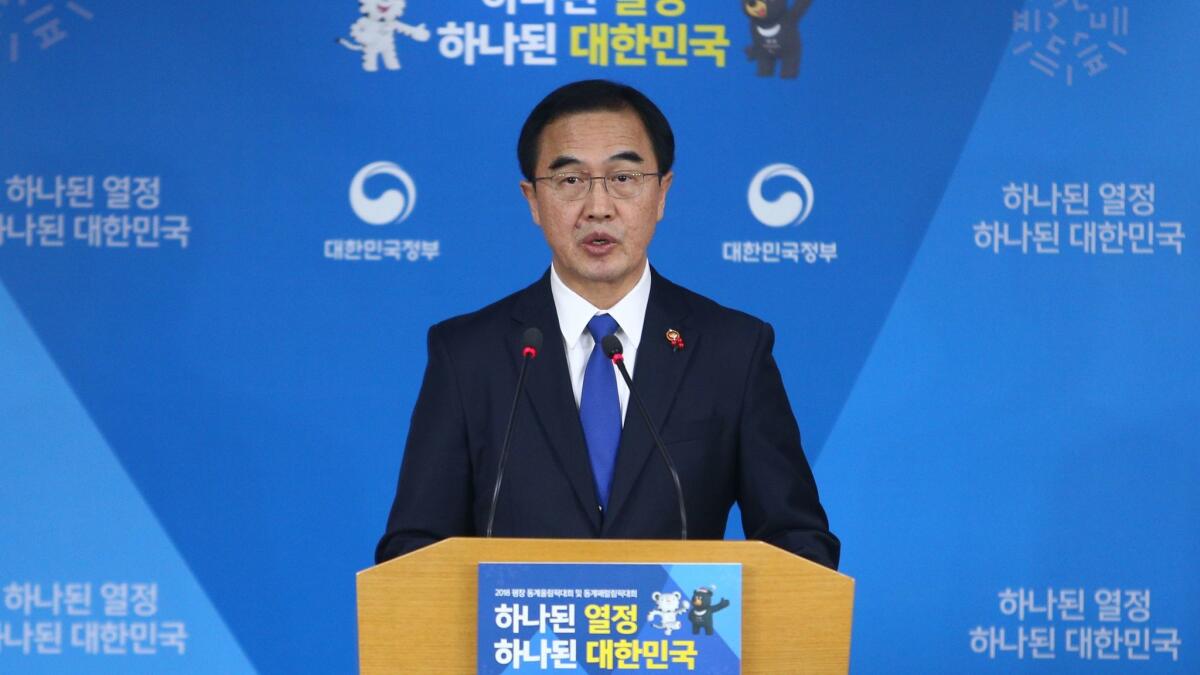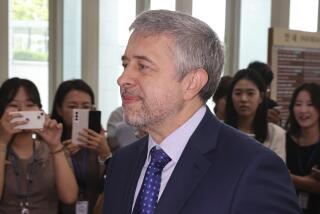Editorial: Talks between the Koreas could be productive — if Trump doesn’t sabotage them on Twitter

Only a day after North Korean leader Kim Jong Un essentially threatened the United States with a nuclear attack, the government of South Korea on Tuesday agreed to talks between the two Koreas. Ostensibly the meeting proposed for Jan. 9 will be about cooperation on next month’s Winter Olympics, but it also could signal a larger and more consequential dialogue between North and South.
The Trump administration is understandably wary of Kim’s interest in talks with the South, concerned, not without reason, that he may be attempting to drive a wedge between the U.S. and its ally. But that hardly explains President Trump’s intemperate response. After initially responding cautiously to the news — suggesting that North-South talks might be “good news” — Trump on Thursday evening was back in a belligerent mood. Belatedly addressing Kim’s reckless claim that he had a nuclear button on his desk, Trump answered with some recklessness of his own: “I too have a Nuclear Button, but it is a much bigger & more powerful one than his, and my Button works!”
We can only hope that Trump’s advisers will talk him back from this latest outburst. They should tell him that more engagement and more talk are generally good things,. Negotiations between North and South Korea could serve to de-escalate tensions that have been elevated by the North’s recent testing binge and exacerbated by presidential tweets like this one and Trump’s reckless talk of “fire and fury.”
It’s also possible — though the odds are long — that talks between the two Koreas could pave the way for a resumption of negotiations that would include U.S. participation. These could be either bilateral talks or a return to the so-called six-party talks that also involved representatives from China, Japan and Russia. Those negotiations collapsed in 2009.
The Trump administration has sent maddeningly mixed signals about the conditions under which the U.S. would return to the table; at one point Secretary of State Rex Tillerson said the U.S. would have a meeting “without preconditions”; later he said that North Korea would have to earn the right to talks by ceasing nuclear and missile tests. Trump has insisted that the U.S. would discuss a “brighter path for North Korea” only “if its leaders cease their threats and dismantle their nuclear program.”
While it is certainly true that North Korea has been a frustrating negotiating partner in the past, and that its nuclear weapons program continues to move forward despite years of diplomacy, those are not persuasive arguments against further efforts to engage.
Perhaps the best argument for allowing South Korea some room for diplomatic maneuver is the fact that its population is the most at risk from North Korea. So long as it keeps Washington apprised of its discussions with the North, it should be encouraged to make the effort.
Follow the Opinion section on Twitter @latimesopinionand Facebook
More to Read
A cure for the common opinion
Get thought-provoking perspectives with our weekly newsletter.
You may occasionally receive promotional content from the Los Angeles Times.










